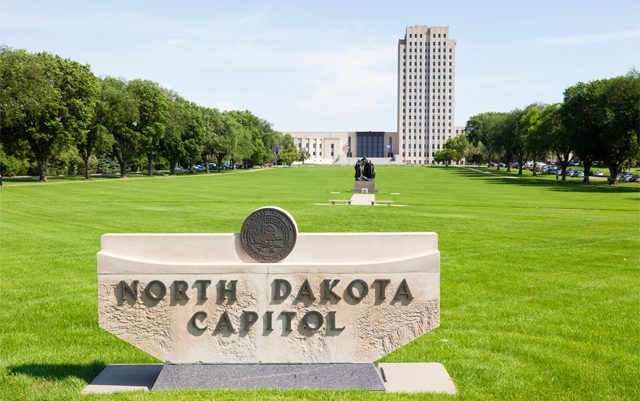Election Day is fast-approaching, and in the world of cannabis the most-watched vote may be the one going down in North Dakota. On November 6th voters there will decide on an adult-use marijuana legalization measure that, if passed, would have no limits on the amount adults could possess and grow (something that I’m sure would not be allowed to stand by the state legislature).
But the lack of limits is not the only thing that gives this measure its historic quality; the vote is happening in one of the “reddest” states in the country.
Political pundits and news reporters in the U.S. have long used the “Democrat states are blue, Republican states are red” formula for keeping things simple on election night, especially when it comes to Presidential elections.
Under the red/blue dynamic, North Dakota is undoubtedly a red state. Trump won ND by 36 percentage points in 2016, and the state hasn’t chosen a Democrat nominee for President since Lyndon Johnson in 1964. Very rural and very conservative, North Dakota is one of the last states one would think would legalize recreational marijuana.
This makes the fact that the issue is on the ballot even more mind-blowing. Polls on the measure have varied wildly, showing majorities against the measure or majorities for the measure, depending on which poll you’re looking at.
The backers of the measure – Legalize ND – are cautiously optimistic about their chances, but they know ND will be a tough nut to crack. “This race is going to be tight as nails, but we are getting positive feedback,” David Owen, Chairman of Legalize ND and author of Measure 3, told The Marijuana Times. “When I knock organic doors in the field, we appear to be winning, but we aren’t going to know for sure until Nov 6th. In terms of tangibles, our activist group has ballooned to over 300, and our total grassroots legalization Facebook group is up to roughly 11,500 people (roughly 4.65% of all votes cast in the last midterm).”
According to David, Legalize ND was born out of the successful effort to legalize medical marijuana in the state in 2016 and the fear that the medical cannabis program was being gutted in 2017. The group saw recreational legalization as the logical next step in getting access to legal cannabis to as many people as possible.
“After 6 months of drafting, the recreational bill was fielded to sponsors, and then after a few more edits from September to December, the bill was submitted for approval for circulation to the Secretary of State and was finally approved mid-December,” David told us. “This led to the official legal formation of Legalize ND to be the campaign arm for full legalization of marijuana for the 2018 election cycle.”
So if the legislature was able to gut the medical marijuana measure, what’s to stop them from doing the same to Measure 3 if it passes? David said the only thing standing between the measure and the legislature are activists in North Dakota. “We will have to protect the win [and] that means ultimately going to Bismarck and protecting the measure as written. In some areas changes will no doubt be made, but it is our job to ensure through direct lobbying that the bill is retained in its purest possible form through the legislative session. If people want to help out with the lobbying efforts they are encouraged to join our mailing list or contribute at legalizend.com.”
If Measure 3 passes on November 6th, it will make North Dakota the reddest state ever to approve recreational cannabis legalization, whether through the ballot box or the state legislature. This would be a historic event that would take a lot of work to keep intact, but the first battle will be fought in just a few days, and it is one that pro-legalization forces must emerge victorious from if cannabis consumers in North Dakota will have any kind of decent access to their medicine of choice.






